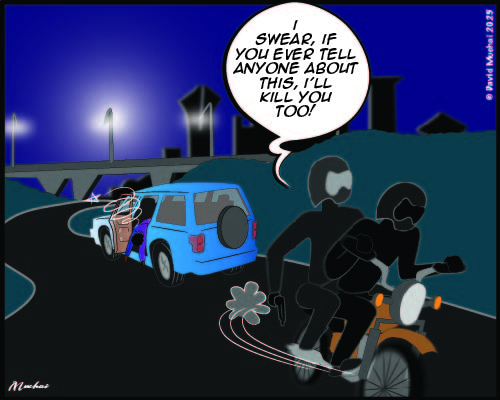
The circumstances leading to the death of the high-profile personality as released by police indicate that his vehicle had stopped at a roundabout, when a pillion passenger on a motorbike who had been trailing him home walked over to the lawmaker’s vehicle and fired a couple of shots at the politician before jumping back to the waiting motorcycle, manoeuvring among the stationary vehicles and disappearing.
The lawmaker's bodyguard and the driver were unharmed, though shaken. The politician was declared dead at a nearby hospital where he was rushed to.
As expected, Kenyans on social media have been loud, dubbing the murder an assassination. This could be a misnomer; the correct attribute to these murders probably should be ‘elimination’ by a hitman.
So, was it an assassination or an elimination by a hitman? What, then, is the difference between the two?
The original assassins were a real, historical organisation of militant Shia Muslims tasked specifically with murder missions. They lend their name to the modern English term "assassination" because of their reputation for covert operations during the Crusades.
Conventional wisdom states that they ritually smoked hashish, and the Arabic word "hashishin" (hash-smoker) was corrupted into "assassin" among the Europeans.
In modern times, an assassination is a planned event where there is no other motive than killing a specific person, mainly tied to political, ideological or symbolic motives.
It’s a planned mission targeting a specific high-profile person, whose extermination is likely to have political repercussions. Therefore, all assassinations are murders, though not all murders are assassinations.
Modern assassins are professional, freelancers and highly skilled, and they are more diverse in their killing methods than hitmen. In the underworld, they are never labelled as assassins but use euphemistic terms like ‘death consultant’ or ‘wet work specialist’.
So what, then, is the difference between an assassin and a hitman? Hitmen are a sub-class of the assassin and are normally contracted for a ‘job’ through criminal connections and crime gangs.
The term ‘hitman’ was originally a mafia lingo, but is now used more loosely for hired hands in contract killings. Most hitmen are normally young members of a criminal organisation and rarely operate outside the criminal circles within a known geographical terrain.
Traditionally, assassins and hitmen are sourced by word of mouth through a series of ‘cutouts’. Cutouts ensure that confidentiality is maintained. In this age of the Internet, the deep web or dark net (the hidden part of the Internet) is the first port of call for any serious person keen to hire an assassin.
Payment is also done anonymously (not credit card or cash, and of course never by M-Pesa!). Lately, with the advanced financial technology, payments are done through escrow accounts or by Bitcoin.
The payment varies with the deemed importance of the target and the likely fallout once the deed is done. It also depends on the professionalism of the assassin; several years back, a local daily opined that hiring a hitman in Nairobi would set you back between Sh300,000 and Sh1,000,000. And that is payment for one “hit”.
So, was the recent political killing done by a hitman or an assassin?
Every analysis points out that this was not a very professional job for the several reasons as indicated.
One, as per the reports so far garnered, several random shots were fired with the belief that one of the shots was likely to be fatal. A professional assassin would go for a single clean, deadly shot, preferably on the head or the heart. A shot that even if the target would not survive even if they were on the operating table with doctors scrubbed for the operation.
Secondly, a professional assassin is a loner. This ensures that the focus is maintained and that the possibility of repercussions is reduced to a minimum. Involving accomplices inevitably leads to some compromising and reduced chances of a clean escape.
Third, there have been no major political consequences. Not to belittle the achievements and standing of that honourable departed gentleman, but the fact is that apart from his constituency and neighbourhood, the departed MP was not known nationally. He was at best a face in the crowd, and his death is bound to register abysmally low on the political landscape.
Lastly, modern security measures are also well advanced, especially in urban settings. Everyone and everything coming into or out of a controlled area is electronically profiled. So the tailing of the MP’s car and the hit at a traffic stop on a weekday and in early evening, in the age of so many CCTVs, only belongs to the stupidity of amateurs.
Finally, the late MP also stands accused. Having expressed fears for his life, he should have been more vigilant, making deep adjustments to his personal security outfit, varying his routine, getting an armoured car and daily being more security-aware of his environment. After all, security starts with you.
Col ( Rtd ) Joseph Owuoth is a former military officer







